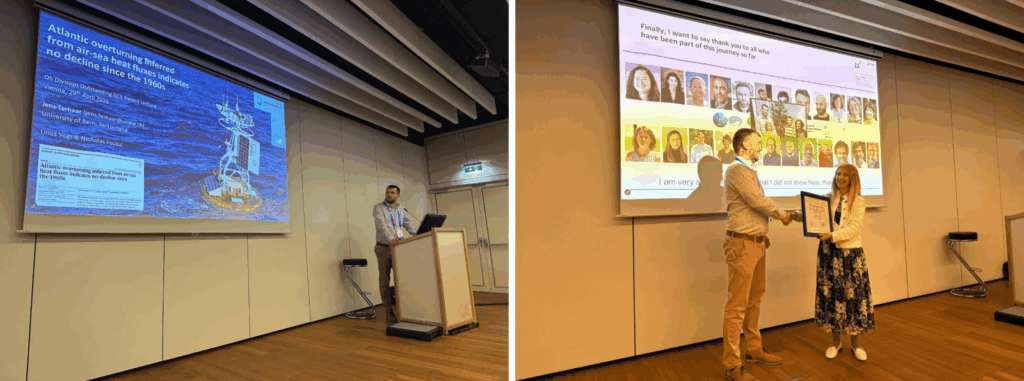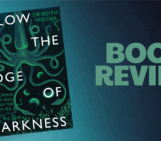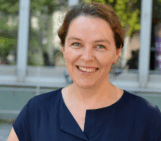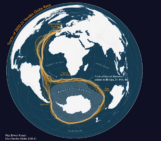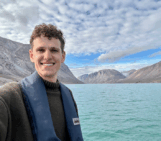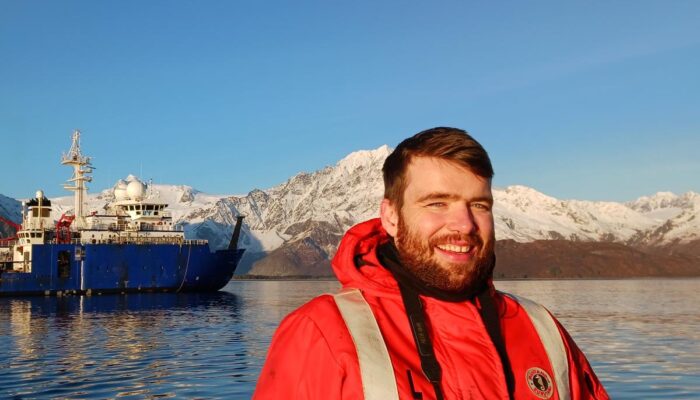
Jens Terhaar received the 2025 Division Outstanding Early Career Scientist Award for his research on the ocean carbon cycle and its effects on climate. We spoke with him about his career path and the work that led to this award.
Since completing his PhD in 2019, Jens has made a name for himself with many publications and outreach efforts. His work is about the ocean carbon sink, ocean biogeochemical stressors, physical oceanography, and ocean-climate interactions. Over time, he has introduced novel concepts, like showing the importance of the land-ocean aquatic continuum for Arctic Ocean primary production and a new way of reconstructing the Atlantic Meridional Overturning Circulation. He has also improved estimates of the ocean’s carbon sink and future ocean acidification, and created a new method for climate predictions, now used by various modeling centers.
🌊 Please tell us about your academic journey and how you got there!
My family comes from the German countryside, with a father who was the first in his family to attend university studying statistics and a mother who was a nurse. I chose to study Physics for the many possibilities it offers and later specialized in Environmental Physics to address climate change, aiming to contribute positively to society and help it face one of its greatest challenges. Thanks to scholarships, I could go abroad to Southampton and to Paris, where I developed a passion for oceanography. I completed a PhD in Paris about the Arctic Ocean biogeochemistry, which connected me with international scientists and institutions. After my PhD, I worked in Bern on ocean-climate interactions. A year at WHOI in the USA allowed me to explore operational oceanography on the icebreaker R/V Sikuliaq in the Arctic. Returning to Bern with a research fellowship, I now lead a project with a PhD student.

Jens Terhaar during fieldwork onboard the icebreaker R/V Sikuliaq in the Arctic Ocean (Image credit: Amanda Kowalski)
🌊 Your research has advanced our understanding of the ocean carbon cycle. What initially caught your interest in this field, and what motivates you to continue exploring it?
🌊 Could you describe your research that led to you receiving this award? What are your major breakthroughs?
It’s really difficult to pinpoint a single piece of research that led to the award, as I have been working on a wide range of different research topics. Firstly, my work in the Arctic highlighted the importance of carbon and nutrient inputs from coastal erosion and rivers for the Arctic Ocean’s biogeochemistry, which has allowed the community to make a large step forward. The second major achievement is constraining the simulated past, present, and future ocean carbon sink and ocean acidification with observations, which has substantially reduced projection uncertainties and shed light on crucial underlying mechanisms. In addition to constraining the ocean carbon sink, I also provided a new estimate of the ocean carbon sink based on the reflections about the strengths and weaknesses of ocean models in hindcast mode and in a fully coupled mode.
Thirdly, my development of the adaptive emission reduction approach has substantially contributed to the way climate simulations are made, allowing models to stabilize at given temperature levels and simulate temperature overshoots. Fourthly, my recent work on the AMOC has shown the importance of coupled climate models for understanding past ocean currents. Lastly, my work on the jump in sea surface temperature in 2023/24 has not only helped to explain this extreme event but has also shown the usefulness of climate models in understanding and projecting earth system changes.
🌊 Can you share what this recognition means to you personally and professionally?
The academic environment is stimulating but competitive, making it hard to see one’s contributions. Awards like this EGU award validate and reward one’s work. However, for me, the greatest recognition was reading the letter my colleagues sent to the committee proposing me for the award. Their positive and friendly words meant even more to me than the award itself.
🌊 What challenges did you face during your career, and how did you overcome them?
Although I had many great supervisors, friends, and colleagues, I also faced difficulties in my career. During my PhD, I had a time when I seriously considered stopping and was in bad mental health conditions, not far away from depression. Overcoming such difficulties is hard, but my family, especially my wife and children, were my biggest support. I also faced challenges due to disagreements with colleagues about science and the academic environment in general, leading to tough times. In the end, I believe openly discussing these issues is most important. If everyone in a conflict is able to talk, is open about difficulties, reconsiders positions or opinions, and is able to apologize for errors, most problems will be solved.
I am outspoken about things I’m unhappy within my work environment or science that I disagree with. This has not always helped me, but I hope that it has improved the environment and science around me.
🌊 Can you tell us about some key moments in your career?
A key career moment was an exchange during my Bachelor studies in England, where I became comfortable with foreign languages and discovered my passion for oceanography. Afterwards key moments were usually linked to meeting special people in academia. I do not want to list all the great people who I had the chance to meet during my time in academia to not forget someone, but I want to highlight one person, Laurent Bopp, who is an exceptional scientist and an even more exceptional person who taught me a lot and was key for my scientific career.
🌊 Looking ahead, what are the next big questions or challenges that you are excited to tackle?
The ocean carbon sink is still difficult to quantify, and much work remains to be done, as the ocean is not only a highly important carbon sink but may also be used to store even more carbon via ocean alkalinity enhancement. I think we still do not know nearly enough about the effect of alkalinity on the ocean carbon sink, even without adding additional alkalinity. With changes in the emissions that hopefully come over the next years and decades, it will be crucial to know how the ocean carbon sink will develop to detect potential unexpected weakenings of this crucial carbon sink, but also to quantify, verify, and monitor mCDR such as ocean alkalinity enhancement. Lastly, we still lack sufficient knowledge about the consequences of climate change for the ocean ecosystem due to changes in biogeochemistry. In all these research directions, ocean biogeochemical models are essential. I would be excited to work on these topics in the future and to continue to combine models and observations.
🌊 Balancing a successful career with family life is no easy task. How do you manage your time and responsibilities, especially as a father of three? Do you have any advice?
Balancing a career with family life is challenging, and there’s no one-size-fits-all answer. My wife and I always prioritized family over work and tried to ensure that we both equally cared for our children and had an equal amount of time for work. Currently, we both work 80% to spend more time with our children. Changing the country and workplace often was possible thanks to my wife’s profession as an environmental engineer. This job allowed her to find work in almost any country. Only for the USA, she took a sabbatical during my scholarship, for which I’m immensely grateful. Prioritizing family has meant making tough decisions, not applying for certain positions, or declining tenure-track offers, but it has allowed me to not only be a scientist but also a father to my children and a husband to my wife. Currently, I hope finding a permanent position that allows me to balance both family and work.
🌊 What advice would you give to young scientists wanting to make a difference in ocean biogeochemistry?
Thank you, Jens, for the interview and for sharing your career insights and advice!
Read more:
Interviewed and edited by J. Behncke

